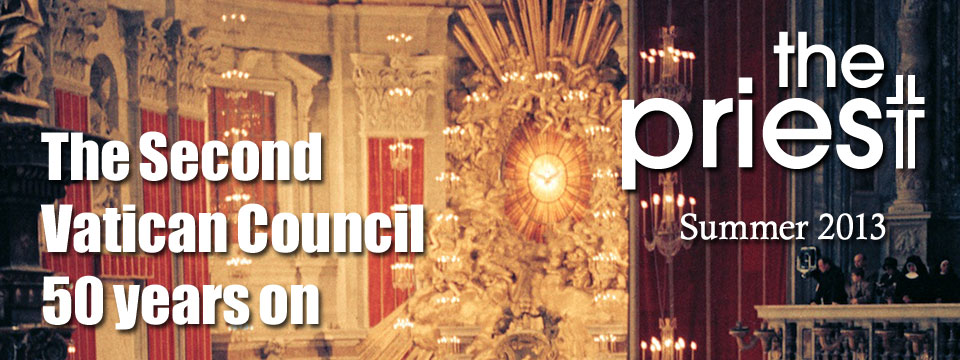A reflection on the ‘Year of Grace’
The decision of the Bishops of Australia to have a “Year of Grace”, with its subtitle “starting afresh from Christ”, was to me at least a surprising outcome to an extended period of reflection by the bishops at their meetings over a period of two years or so. The proposal for a reflection on how the bishops could best respond to the challenges we face in Australia at this moment in our history was an initiative of the then President, Archbishop Wilson. He proposed an open ended discussion on the topic.
Generous allocation of time at the plenary sessions of the Bishops’ Conference allowed the opportunity for bishops to put forward their thoughts in a considered way. These sessions were times of listening and times in which, due to particular interventions, the direction moved in, what I thought, were rather unexpected ways.
What began as a discussion as to what we should do moved to a point where it became clear that the issue was not so much about what should be done as to what we need to become.
One Archbishop made the simple yet critical statement: “It is all about Jesus”. It was this simple statement that led the conference down a path that has resulted in this “Year of Grace”. The year is intended as a time to encourage Catholics to enter more deeply into their life in Christ, the life of grace. The sub theme of “Start Afresh from Christ” captured the clear Christological orientation to this year and its ultimate goal.
Having this Year of Grace is in itself, I believe a work of grace. It is my conviction that the grace of the Holy Spirit was active among the bishops during this process and guided us to this particular outcome.
Doing and Being
As Catholics we are very good about doing. The Catholic Church is very active. We have many diverse organisations which provide education, healthcare, welfare and charity. We can be justifiably proud of our wide range of activities inspired by our Catholic faith. We are busy about doing many things as the Lord commented to Martha.
However, I think the average Catholic is not so good at being. We know that many of our agencies do good work, but we are also concerned about the level of their explicit Catholic identity. We know that many who work for the Church stand somehow beside or outside the Church. We know that many of our committed Catholics do not have a strong inner spiritual dimension to their Catholic faith. Even our onside Catholics can tend to be more tribal than animated by a deep personal relationship with God.
We are aware that it is who we are that gives life and vitality to what we do. Thus, it is the quality of our inner life of faith – our relationship with God in Jesus Christ – that should be the source of what animates all that we do in and through the Church. If this is lacking then we may do what is required of us, but its spiritual potential will be severely limited. Over time the works will be more humanistic or even simply bureaucratic. This was the concern reflected by Pope Benedict in Deus caritas est when he commented: “. it is very important that the Church’s charitable activity maintains all of its splendour and does not become just another form of social assistance” (n 31).
Contemporary Pelagianism
One opportunity that this Year of Grace offers us is to address what I believe is a real issue among Catholics today – that issue is that many Catholics have a Pelagian view of being Christian. How many Catholics really grasp the fact that they are, to quote St Paul, “saved by grace through faith”?
The Pauline teaching that we are saved by grace is something that many Catholics find hard to fathom. In his letter to the Ephesians he says, “For it is by grace you have been saved, through faith —and this is not from yourselves, it is the gift of God— not by works, so that no one can boast” (Eph 2, 8-9). St Paul emphasised a key understanding about the nature of Christian soteriology that we are saved by grace and not by works. This teaching does mystify many Catholics.
On this matter I think it is useful to revisit the teaching of St Augustine of Hippo who is called the “Doctor of Grace”. We know from our theological training that he wrote on the subject of grace in answer to the teaching of the fourth century British monk, Pelagius. Pelagius emphasized human freedom and will as the key to living the Christian life. In other words, Pelagius believed we could save ourselves by our own effort. St Augustine strongly challenged this view.
In his Confessions as he reflects on his own life St Augustine says, “all my hope is nothing except in Your great mercy”, and then adds in prayerful thanks to God, “it is only by Your grace and mercy that You have melted away the ice of my evil.” St Augustine understood in the light of his experience that it is God gives us the power to respond to him. He says, “You commanded me … and since you gave me the power, it was so done.” He understood that grace prefaces and enables all good actions.
Many today do not appreciate the importance of grace in the Christian life. We tend to think that we can manage by ourselves. We think we can save ourselves by our own efforts. We say to ourselves: “I will try to lead a good life”. This was what Pelagius proposed. His teaching is still very much alive today. This Year of Grace is an opportunity for us to address this blind spot in the minds of many Catholics.
Without getting too far off the track it also opens up the question of the nature of salvation. Many Catholics consider that we save ourselves and earn the right to heaven. I think that many Catholics imagine that when they stand before the judgement seat of God and the Book of Life is opened that it is like a book of accounts with a debit page and a credit page. Many good people are quietly confident that in the end the credits will far outweigh the debits and that we will hear the words, “well done good and faithful servant”. They will feel that that have rightly earned a place in heaven.
St Paul and St Augustine would say quite definitively that we cannot save ourselves. St Paul summed up what the Christian life is in these words, “We are all God’s work of art” (Eph 2:1), that is, the good in us is solely the fruit of God’s action in our lives. We must co-operate, yes, but the fruit is God’s work and not ours.
Explaining Grace
How can we explain grace? Its meaning eludes many Catholics. Theological definitions are helpful. Perhaps the explanation in the Catholic Catechism is a good starting point.
The teaching on the gift of faith is useful. Referring to the Lord’s comment to Peters testimony of faith in him the Cathechism teaches:
Faith is a gift of God, a supernatural virtue infused by him.”Before this faith can be exercised, man must have the grace of God to move and assist him; he must have the interior helps of the Holy Spirit, who moves the heart and converts it to God, who opens the eyes of the mind and ‘makes it easy for all to accept and believe the truth. (CCC 153)
A thought I offer you is that grace is a little like breathing. We do not often think about the fact that we breathe, but it is vital to our staying alive. So too grace – the Holy Spirit – initiates and sustains our faith and spiritual life. St Paul said that we cannot even say “Jesus is Lord” without the action of the Holy Spirit (see I Cor 12:3). Thus, just because we do not allude to the action of the Holy Spirit it does not mean He is not active within us.
This Year offers us an opportunity to focus on the reality of grace in the Christian life. While it is not an easy concept to explain it is most important not only for the individual Catholic to understand the dynamics of salvation but also such an understanding provides the foundation as to how we approach our ministry and service as a Church.
It seems that we need to recapture a sense of the spiritual dimension to Christian life and mission.
St Thomas Aquinas comments on this matter in these words,
Now there are five effects of grace in us: of these, the first is, to heal the soul; the second, to desire good; the third, to carry into effect the good proposed; the fourth, to persevere in good; the fifth, to reach glory. (De Natura et Gracia xxxi)
He teaches here that grace precedes any good action, enables it to take place and produces the fruit from the action. Such an awareness would encourage the engagement of practical faith in the day-to-day living of the Christian life. It would encourage the practice of entrusting our works to God for his blessing and direction.
Divine Providence
This opens up another part of Catholic tradition which is largely lost today: that of the role of Divine Providence. The saints understood this well. They knew that they were part of a greater plan. Their lives were not simply the product of their own effort but rather God played an active role and would be an agent in their life and mission. They learnt to rely upon Divine Providence because of their conviction of being caught up in the Divine Plan.
A prayer of St Jane Francis de Chantal comes to mind:
Therefore I resolve with Thy Divine assistance, 0 my Saviour, to follow Thy desires and Thy ordinances, without regarding or examining why Thou dost this rather than that; but I will blindly follow Thee according to Thy Divine will, without seeking my own inclinations.
The Catholic spiritual tradition has a lively sense of trust in Divine Providence. Saints were only too aware of their own frailty and readily abandoned themselves to the wisdom and grace of God. The saints were aware that we are totally dependent on grace. They understood that grace is everything.
Quality of our relationship with God
The Year of Grace is a time for us to pause and examine the quality of our life in God. Every relationship is a dynamic thing. We are either closer to someone or we have moved further from them. In the case of a marriage the patterns of life may be the same, but the union of mind and heart between the couple is either growing or diminishing. So too in our relationship with God. At the external level things may appear the same, but our heart is either more inflamed with the love of God, or the love of God has grown cold within us.
Any relationship is really about the communication between the two people involved. Thus in our relationship with God the quality of the relationship will be indicated by the quality of our prayer. We can examine ourselves as to how much time we devote to prayer but more importantly we can examine the quality of our prayer. It is not just quantity but quality. We all know that prayer – particularly that prayer expected of us by the Church – can become functional.
This Year of Grace leads naturally to consider the quality of prayer in each of our lives. The bishops were drawn to a phrase used by Blessed John Paul II in his Apostolic Letter, Novo Millennio ineunte, of the year 2001 where he encouraged all Catholics to “contemplate the face of Christ”. This is a strangely attractive invitation. The face of the person is the image of the person. When we look into their face we are seeing to come to really know the person.
Blessed John Paul II comments that “to ask believers not only to ‘speak’ of Christ, but in a certain sense to “show’ him” (n.16). A person who has contemplated Christ and knows him intimately will be able to “show” him to others. In other words, the depthing of our relationship with Christ is vital for evangelisation. The closer we are to Christ, the more we will be able to bring him to others.
In Ecclesia de Eucharistia Pope Benedict speaks of “Eucharistic amazement” – term used by Blessed John Paul II in Novo Millennio ineunte – in relationship to contemplating Christ. He says, “To contemplate Christ involves being able to recognize him wherever he manifests himself, in his many forms of presence, but above all in the living sacrament of his body and his blood”. He refers to the experience of the two disciples on the road to Emmaus: “their eyes were opened and they recognized him” (Lk 24:31).
One of the very encouraging movements in the Church at this time is the rediscovery of adoration of the Blessed Sacrament. This is particularly encouraging when it is seen among the young. Adoration is becoming more and more a feature of youth activities, certainly here in the Archdiocese of Sydney. The success of the Corpus Christi Procession, Walk with Christ, held here in Sydney bears witness to this trend.
Personal relationship with Christ
I have noticed a way in which Pope Benedict has been speaking about faith in Jesus Christ. He has been using the term “personal relationship”, something which we might be more used to hearing from an evangelical Christian. For example he said this:
“Christianity is not a new philosophy or new morality. We are Christians only if we encounter Christ… Only in this personal relationship with Christ, only in this encounter with the Risen One do we really become Christians… Therefore, let us pray to the Lord to enlighten us, so that, in our world, he will grant us the encounter with his presence, and thus give us a lively faith, an open heart, and great charity for all, capable of renewing the world.” (Sept 3, 2008)
He sees that the task of the Church is to enable people to discover Jesus Christ in a personal way:
“The evangelization of the person and of human communities depends totally on this encounter with Jesus Christ.” (Nov 13, 2007)
In Deus caritas est he states: “Being Christian is not the result of an ethical choice or a lofty idea, but the encounter with an event, a person, which gives life a new horizon and a decisive direction.” (n.1)
These examples can be multiplied. What is in evidence is that Pope Benedict is aware that the heart of what the Church has to offer the world is Jesus Christ. Hence in his inaugural Mass in 2005 he echoed the theme of Pope John Paul II in his inaugural Mass in 1978:
“Do not be afraid of Christ! He takes nothing away, and he gives you everything. When we give ourselves to him, we receive a hundredfold in return. Yes, open, open wide the doors to Christ – and you will find true life”.
The Year of Grace with its subtheme to “Start afresh from Christ” is an invitation by the bishops to focus attention on the centrality of our personal relationship with Jesus Christ. To start afresh from Christ, one has to focus more intensely on our relationship with him.
Year of Faith
As the bishops of Australia have made this decision to hold a “Year of Grace”, Pope Benedict has announced a “Year of Faith” (October 11, 2012 to November 24, 2013).
We can see that his ideas parallel the Australian bishops. He described the Year of Faith as a “moment of grace and commitment to an even fuller conversion to God, to reinforce our faith in him and to proclaim him with joy to the people of our time”.
It would seem then that this is a providential time for us all. It is a time to revisit the heart of our Catholic faith. It is a time to seek God more earnestly. It is a time to recognise that each of us has a deep longing in our hearts – for God.






